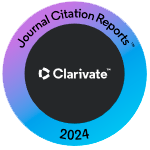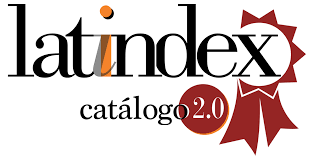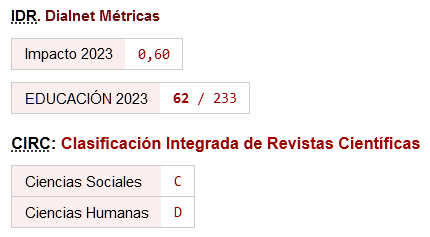The rugby training in coaches from Almeria
DOI:
https://doi.org/10.46661/ijeri.3815Keywords:
Rugby coach training, initial training, skills training, sports educationAbstract
The sport practice has increased during the last decades, which has propitiated that sport became a great social, educational and politic phenomenon. Therefore, governments of developed countries have increased the investment in the coaching development. Research shows the importance of the theoretical and practical bases for coaching transmitted in formal training activities, however is also questioned the effectiveness of these type of courses. Consequently, it is critical to study and to know more about these training processes. In this study, it have been sought to better understand the reality of the rugby training courses in the province of Almería (Spain). It have been carried out a quantitative methodology, via a questionnaire, which achieved related data for the initial formation of the coaches. Once the process of elaboration of the instrument was concluded, it was applied to 27 rugby coaches in the province of Almería. In this sense, a descriptive analysis was performed, and according to the most relevant results, it can be deducted that the most of the rugby coaches surveyed have the minimum level of coaching certification, and that they agree with the duration, content and distribution of theoretical and practical activities during the courses carried out by the Andalusian federation.
Downloads
References
Abraham, A., Collins, D., & Martindale, R. (2006). The coaching schematic: Validation through expert coach consensus. Journal of Sports Sciences, 24(06), 549-564.
Bisquerra, R. (2004). Metodología de la investigación educativa Editorial La Muralla.
Cabero, J., & Barroso, J. (2013). La utilización del juicio de experto para la evaluación de TIC: El coeficiente de competencia experta.
Bordón.Revista De Pedagogía, 65(2), 25-38.
Campos, A. (2005). Situación profesional de las personas que trabajan en funciones de actividad física y deporte en la comunidad autónoma valenciana (2004) Available from Facultad de Ciencias de la Actividad Física y del Deporte. Universidad de Valencia, Valencia.
Cañadas, L., Santos-Pastor, M. L., & Castejón, F. J. (2019). Teaching competences in physical education teacher initial training. RETOS.Nuevas Tendencias En Educación Física, Deporte Y Recreación, 35, 284-288.
Cassidy, T., & Kidman, L. (2010). Initiating a national coaching curriculum: A paradigmatic shift? Physical Education and Sport Pedagogy, 15(3), 307-322.
Cassidy, T., & Rossi, T. (2006). Situating learning:(Re) examining the notion of apprenticeship in coach education. International Journal of Sports Science & Coaching, 1(3), 235-246.
Colom, A. J. (2005). Continuidad y complentariedad entre la educación formal y no formal. Revista De Educación, (338), 9-22.
Conroy, D. E., & Coatsworth, J. D. (2006). Coach training as a strategy for promoting youth social development. The Sport Psychologist, 20(2), 128-144.
Coté, J., Saimela, J., Trudel, P., Baria, A., & Russell, S. (1995). The coaching model: A grounded assessment of expert gymnastic coaches’ knowledge. Journal of Sport and Exercise Psychology, 17(1), 1-17.
Cottrell, D. (2015). Everything you need to know for coaching rugby (2ª ed.). Guilford: Green Star Media Ltd.
Cunha, G., Mesquita, I., Moreno, M. P., Boleto, A. F., Tavares, T. M., &
Silva, P. F. (2010). Autopercepción de las competencias profesionales de los entrenadores de fútbol en función de la experiencia personal y de la formación académica. Cuadernos De Psicología Del Deporte, 10(1), 23-36.
Cushion, C. (2005). Learning to coach: Linking theory and practice, novice and expert. The New PE Y Sports Dimension, October on-Line,
Demers, G., Woodburn, A. J., & Savard, C. (2006). The development of an undergraduate competency-based coach education program. The Sport Psychologist, 20(2), 162-173.
Diego, R., Fraile, A., & Boada, J. (2004). Training needs among sport technicians. Psicothema, 16(1)
Feu, S. (2004). Estudio de los modelos y variables que afectan al entrenador español de balonmano Available from Tesis doctoral. Universidad de Extremadura, Cácares (España).
Feu, S., Ibáñez, S. J., Lorenzo, A., Jiménez, S., & Cañadas, M. (2012). El conocimiento profesional adquirido por el entrenador de balonmano: Experiencias y formación. Revista De Psicología Del Deporte, 21(1)
Gilbert, W. (2017). Coaching better every season: A year-round system for athlete development and program success. Leeds: Champaign, IL: Human Kinetics.
Gilbert, W. D., & Trudel, P. (1999). An evaluation strategy for coach education programs. Journal of Sport Behavior, 22(2), 234.
Gilbert, W. D., & Trudel, P. (2004). Analysis of coaching science research published from 1970–2001. Research Quarterly for Exercise and Sport, 75(4), 388-399.
Giménez, F. J. (2003a). El deporte en el marco de la educación física. Sevilla: Wanceulen.
Giménez, F. J. (2003b). El entrenador en la iniciación deportiva. In Wanceulen (Ed.), Fútbol. cuadernos técnicos. [Fútbol. Cuadernos técnicos.] (2003rd ed., pp. 52-64). Sevilla: Wanceulen.
Hernández Sampieri, R. (2014). Metodología de la investigación (6ª ed.). Mexico: McGraw-Hill/Interamericana Editores, S.A.
Hortigüela, D., Pérez, A., & Fernández, J. (2016). Influencia de las experiencias vivenciadas por el alumnado en el desempeño de futuras competencias docentes. Contextos Educativos.Revista De Educación, (19), 25-41.
Ibáñez, S. J., Delgado, M. A., Lorenzo, M., Del Villar, F., & Rivadeneyra, M. L. (1997). (1997). Análisis de la formación del entrenador deportivo. el entrenador de baloncesto. Paper presented at the Experiencias De Formación De Docentes Y Entrenadores En El Ámbito De La Actividad Física Y El Deporte, 83-130.
Kidman, L. (2005). Athlete-centred coaching: Developing inspired and inspiring people IPC Print Resources.
Knowles, Z., Gilbourne, D., Borrie, A., & Nevill, A. (2001). Developing the reflective sports coach: A study exploring the processes of reflective practice within a higher education coaching programme. Reflective Practice, 2(2), 185-207.
Light, R., Evans, J. R., Harvey, S., & Hassanin, R. (2015). Advances in rugby coaching: An holistic approach. Nueva York: Routledge.
López, G., Vázquez, E., & Jaenes, J. C. (2017). Design and validation of the questionnaire on the initial training degree of sports coaches: QUGRAFOR®. Educational Excellence, 3(1), 52-62.
López, G., Vázquez, E., Jaenes, J. C., & López, E. (2018). Docencia y formación de los entrenadores de rugby en cádiz [teaching and training of rugby coaches in cadiz]. Apunts: Educació Física i
Esports., 134(4º trimestre (octubre-diciembre)), 84-94. doi:http://dx.doi.org/10.5672/apunts.2014-0983.es.(2018/4).134.06
Lyle, J. (2007). A review of the research evidence for the impact of coach education. International Journal of Coaching Science, 1(1), 19-36.
Lyle, J., & Cushion, C. (2010). Sports coaching E-book: Professionalisation and practice. Edinburgh: Elsevier Health Sciences.
Marín, F. J. (2004). Capacidades y conocimientos que un entrenador de fútbol base debe poseer para la formación del joven futbolista, jugadores y directivos de la provincia de almería. En M.A. naharro,
J.díaz, R. varela, S. romero, J.P. sanchís, J. roca, J.M. lara, F. carrasco, A. aliaga y F.J. monrové (eds.), congreso nacional de deporte en edad escolar, "deporte y educación" (pp. 339-409). Dos Hermanas (Sevilla): Patronato Municipal de Deportes.
Martinez, O., & Gil, J. (2001). El parámetro "responsables" en el sistema deportivo de aragón. Diputación general de aragón. (eds) en cuadernos técnicos del deportes 32. XIX seminario aragonés "municipio y deporte". (pp. 11-68). Zaragoza: Caspe.
Nash, C., & Collins, D. (2006). Tacit knowledge in expert coaching: Science or art? Quest, 58(4), 465-477.
Nelson, L., Cushion, C., & Potrac, P. (2013). Enhancing the provision of coach education: The recommendations of UK coaching practitioners. Physical Education and Sport Pedagogy, 18(2), 204-218.
Nuviala, A., León, J. A., Gálvez, J., & Fernández, A. (2007). Qué actividades deportivas escolares queremos: Qué técnicos tenemos. Revista Internacional De Medicina Y Ciencias De La Actividad Física Y Del Deporte, 7(25), 1-9.
Paez, J. C., & Almonacid, J. H. (2019). Formación inicial docente en profesores de educación física. levantamiento de competencias específicas a partir de las necesidades del medio educativo. RETOS. Nuevas Tendencias En Educación Física, Deporte Y Recreación, 3, 61-66.
Pérez, M. C. (2007). Estudio cualitativo sobre entrenadores de alto rendimiento deportivo. Revista De Psicología Del Deporte, 11(1)
Phillips, M. (2000). From sidelines to centre field: A history of sports coaching in australia. Sydney: UNSW Press.
Rodriguez-Gómez, I., Del Valle, S., & De la Vega, R. (2018). Revisión nacional e internacional de las competencias profesionales de los docentes de educación física (national and international review of physical education teachers’ professional competences). RETOS.Nuevas Tendencias En Educación Física, Deporte Y Recreación, (34), 393-388.
Trudel, P., & Gilbert, W. (2006). Coaching and coach education. En D. kirk, D. MacDonald y M. O`Sullivan (eds.), the handbook of physical education (pp. 516-539). Thousand Oaks: CA: Sage.
Williams, S. J., & Kendall, L. (2007). Perceptions of elite coaches and sports scientists of the research needs for elite coaching practice. Journal of Sports Sciences, 25(14), 1577-1586.
Woodman, L. (1993). Coaching: A sciencie, an art, an emerging profesion. Sport Science Review, 2(2), 1-13.
Wright, T., Trudel, P., & Culver, D. (2007). Learning how to coach: The different learning situations reported by youth ice hockey coaches. Physical Education and Sport Pedagogy, 12(2), 127-144.
Yagüe, J. (1998). El trabajo colaborativo como estrategia de formación permanente del entrenador de fútbol. Unpublished Tesis Doctoral, Universidad De Valladolid, Valladolid.
Downloads
Published
How to Cite
Issue
Section
License
Copyright (c) 2019 IJERI: International Journal of Educational Research and Innovation

This work is licensed under a Creative Commons Attribution-NonCommercial-NoDerivatives 4.0 International License.












